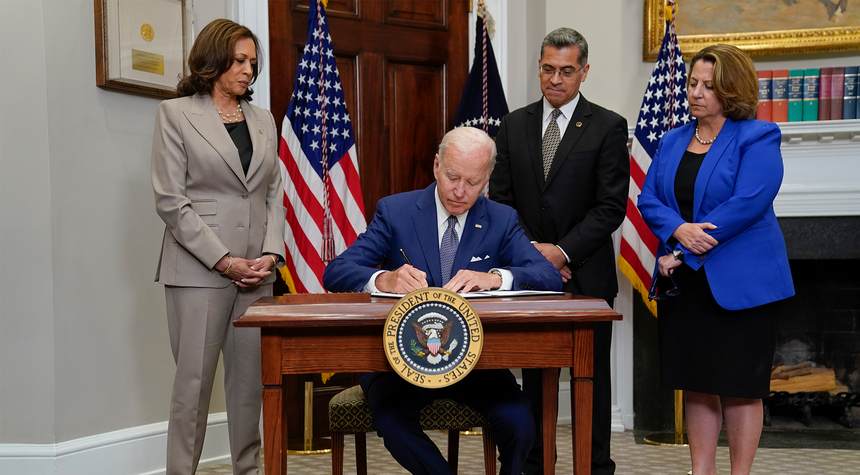Once upon a time, back when “Saturday Night Live” was funny on a consistent basis in the late 1980s, one of cast member Dana Carvey’s best recurring characters was known as “The Church Lady.” And one of that character’s catchphrases couldn’t be more relevant to this story.
In late August, we wrote about the Biden administration’s illegal giveaway in the form of student loan debt “cancelation”–up to $2,000 a pop, in some cases. Biden got pushback of course from conservatives, who saw through it as a bailout for a sacred, Democrat party special interest group. But it also was panned by members of his own party, as my colleague Brandon Morse noted, including Rep. Chris Pappas of New Hampshire, as sidestepping how our goverment is supposed to work:
Pappas acknowledged that student loan debt was “crushing families” but noted that Biden sidestepping Congress to control the national purse is no way to go about doing this.
“Any plan to address student debt should go through the legislative process, and it should be more targeted and paid for so it doesn’t add to the deficit,” wrote Pappas.
That’s pretty incredible, for a Democrat to glean–without saying it explicitly–that what Biden is doing is not one of the powers delegated to the executive branch in the Constitution. We hinted in another piece at the time that lawsuits were coming over the move. And that’s exactly what happened Tuesday, with a suit brought by the Pacific Legal Foundation.
But on Thursday, the Biden Department of Education quietly changed the requirements listed on its website, on the “forgiveness” being offered for some student loan borrowers, allowing a federal judge to scuttle the suit in its current form.
A federal judge on Thursday denied a challenge to President Biden’s student debt forgiveness plan filed by the Pacific Legal Foundation (PLF).
PLF on Tuesday became the first organization to challenge the Biden administration’s move to forgive up to $20,000 in student debt per borrower, alleging it is illegal because Congress, which holds the power of the purse, did not approve it.
The group filed the suit on behalf of one of its attorneys, alleging he would suffer irreparable harm because the plan would automatically forgive his debt and force him to face state tax liability.
…
But the judge on Thursday denied the motion after the Department of Education updated its website to clarify no one would be forced to take part in the debt forgiveness, a clarification that came after the department cast the lawsuit as “baseless” for claiming they would.
“If you would like to opt out of debt relief for any reason, including because you are concerned about a state tax liability, you will be given an opportunity to opt out,” the department’s website reads after Wednesday’s update.
The Hill adds that “U.S. District Court Judge Richard Young ruled that the PLF attorney can no longer be irreparably harmed by the policy since he can now opt out, throwing out his motions for a temporary restraining order and preliminary injunction to halt Biden’s plan.”
There are a few silver linings here, though; the first one is that the judge didn’t throw out the PLF’s suit entirely, just asked the group to “amend its complaint following the ruling. The judge asked PLF to consider in its new filing if it has standing to file a lawsuit. He also noted that the Education Department’s plan is ‘still evolving’ and asked PLF to consider if the case is ready to be adjudicated.”
There’s also the fact that six states filed a separate lawsuit against the student loan bailout on Thursday, as my colleague at sister site Hot Air, Ed Morrissey wrote:
Iowa, Kansas, Missouri, Nebraska, South Carolina, and Arkansas launched their own lawsuit, covering some of the same legal ground as Pacific Legal Foundation‘s lawsuit on behalf of [PLF attorney] Frank Garrison.
…
The PLF lawsuit predicates Garrison’s standing on the tax liability this will impose immediately on him. However, the guts of that case has to do with unconstitutional provisions in the HEROES Act and violations of the Administrative Procedure Act (APA), on which judges often rely when issuing injunctions.
But now, CBS News writes in a piece published Saturday that “[t]he department hasn’t explained the reason for the change,” though noting the, ahem, coincidence that it “came the same day that six GOP-led states sued the Biden administration over the student debt relief.” No mention of the PLF suit, though.

